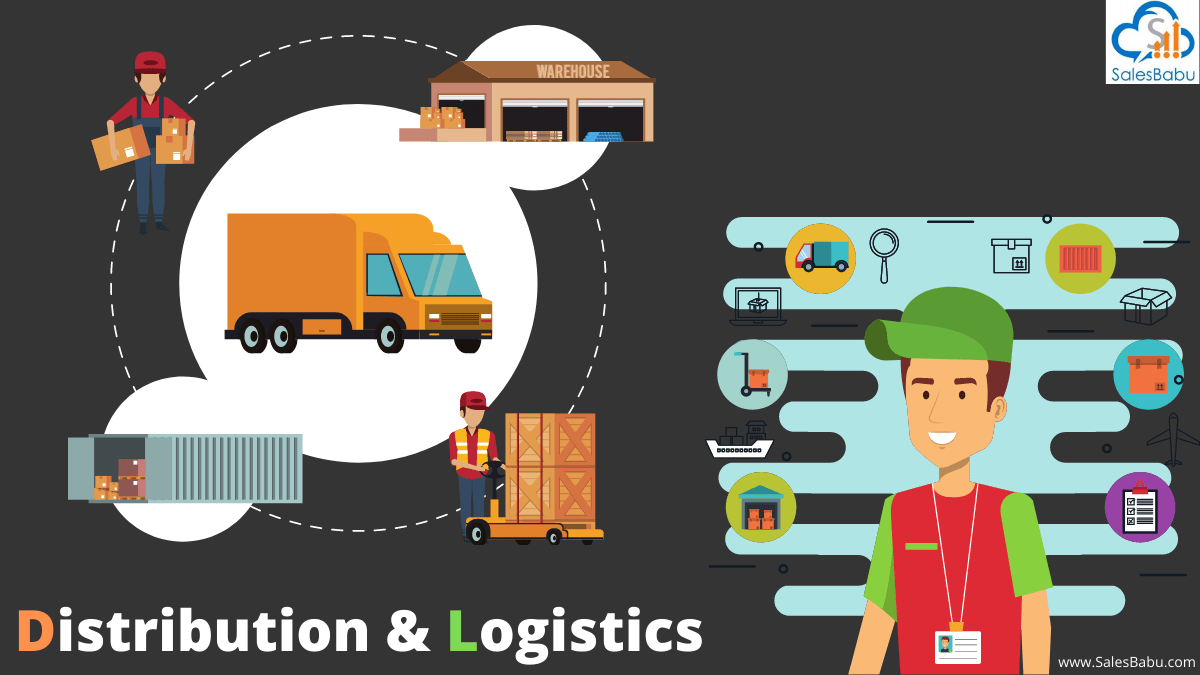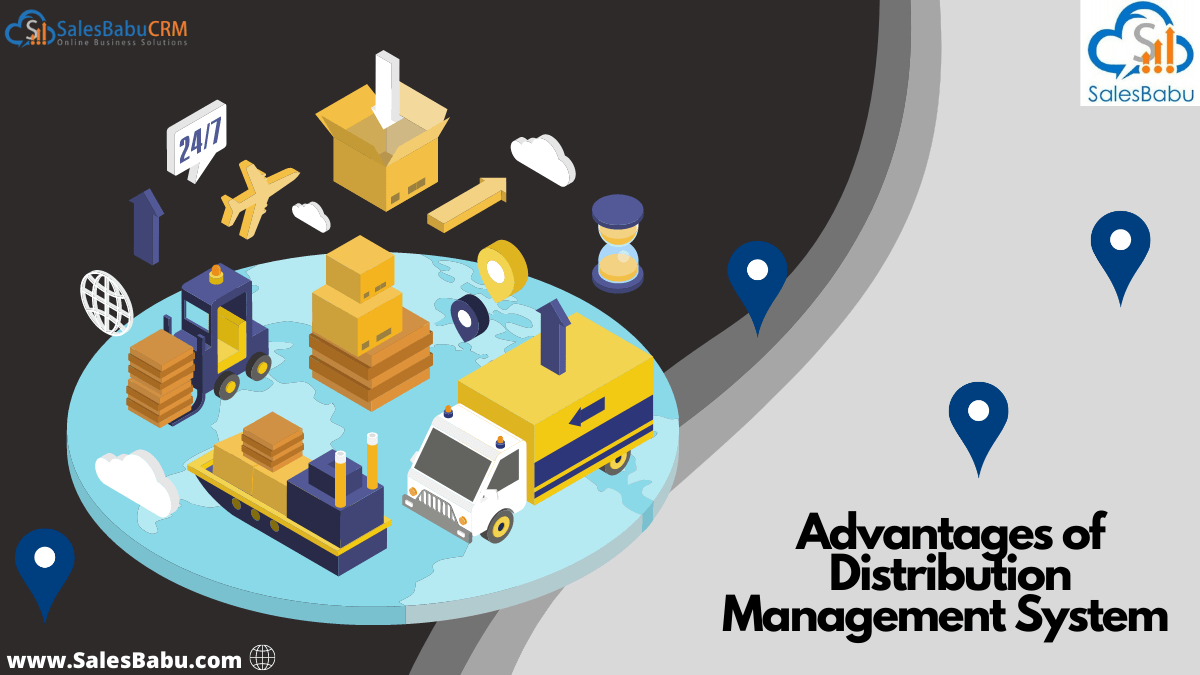The distributor management system has long been a challenge for many business organizations and companies. The raw goods and products might arrive too early and might completely get bad before they are used well.
Or sometimes, finished goods and products might arrive very late, allowing a business competitor in the current competitive world to seize a huge portion of the current valuable market share.
Effective and efficient distribution is very crucial that some of the sub-discipline practices and habits will become an integral quarter of any business supply chain and inventory management of a business, such as just in business time inventory.
However, an overall view is that successful distribution will involve various moving quarters and methods which require a very strong distribution management system software strategy that is fueled by real-time important data and information to run a business well.
Distribution Management: Distribution management is an important process that is used to oversee the activities and movement of your business products and goods starting from a supplier to a business manufacturer continuing to a retailer or a wholesaler and final destination to the end consumer, customer, or prospect.
Various activities, events, and business operations or processes are being involved and maintained at their best, including the business’s raw products and good vendor management, transactions, packaging, warehousing, inventory, business supply chain, many logistics, and at times even business blockchain and concerned data.
Distributor: A business distributor is an entity that will supply goods and products to business retailers and other business organizations that will sell directly to customers, prospects, and consumers. For instance, a business wholesale liquor distributor would supply alcohol to many restaurants, shops, grocery stores, and liquor stores.
Some of the other examples or instances include a proper business produce distributor that will supply lettuce, tomatoes, potatoes, and other might produce to restaurants; and sometimes a pharmaceutical business distributor that will supply a wide range of prescription-controlled drugs which is varied to pharmacies.
Read our blog – 11 Benefits Of Using A Powerful Distributor Management System
Distribution and Logistics : Logistics comprises the complicated and meticulously planned business processes that assure the seamless and effective flow of products and goods. Such logistics operations include an elevated range of business events, activities, and processes, comprising aspects like supply chain management, heavy shipment handling, safe packaging, temperature control, fleet management, route optimization, shipment monitoring, and warehousing inventory management.
Business logistics can be rather more visualized as the physical distribution and management of such processes through a well-organized distribution and management system.
Distribution within the domain of business determines a software and tool for maintaining orders across several distribution channels and is mostly integrated with high quality distribution ERP systems.
A distribution channel or distribution management software indicates the network of agents and entities by which a business product or service proceeds from its source to the end consumer, prospect, or customer. Some common examples of distribution channels and distribution management software involve e-commerce platforms, wholesalers, retailers, and independent third-party distributors.
Business distribution comprises a spectrum of activities, events, operations, and processes, that is customer and commercial packaging, order completion, and shipping. In aspect, distribution can be concisely well renowned as a sales distributor management system.

Read our blog – Advantages Of Using A Distribution Management System Software

Importance of Distribution Management System: A Distribution management system is the first and foremost important thing about organizing everything in a business that is involved in getting various products and goods to the buyers and business people in a timely fashion with less amount of wastage.
Hence, it has a direct effect and impact on your business profits and success. Hence, you need to make proper use of the distribution management system software and dealer distribution management system, and the best distribution ERP to run a business really well and to gain the important features of a distributor management system as a benefit.
A Distribution Network and its Benefits: A distribution network model describes a connected group of huge storage facilities, transactions, and many business transportation systems. It is usually formed in accordance with a huge distribution management strategy designed to move your business products and goods from one business manufacturer to a business wholesaler, retailer, or buyer who is interested in your business.
Advantages of Distribution Management System
Apart from delivering certain higher business profits, a distributor management system will eliminate wastage in a various number of ways, which will range from much-reduced spoilage to certainly reduced business warehousing costs and expenditures since many business goods and products will be able to be delivered as required, instead of being stored in a huge bulk within your business organization.
Distribution management software will lead to decreased and least shipping charges with faster delivery to prospects and customers, and it will also make things simpler and easier for many buyers as it will allow one-stop shopping along with many other important conveniences and bonuses with rewards, such as customer and prospect loyalty rewards and bonus events and programs.
Also, DMS provides real-time visibility into inventory stock, order status and shipments. It helps companies to make the best decision about their distribution and solve problems quickly. It reduces the cost by optimizing stock level and warehouse operations. It helps in customer service improvement by providing faster order processing, this makes customers satisfied and loyal.

Challenges of Distribution Management
Many Distribution challenges might arise from a wide range of disruptions within a business organization. Naturally, these disruptions will include severe and vast weather events or effects, shortage of raw material in your business for instance bad crop years, damages from pests, and epidemics and pandemics, all these include in the natural disruptions. Many human disruptions will include riots, protests, wars, strikes, and many more.
Many damages include transportation disruption which includes the transport vehicle disrepair, downtimes in maintenance, and accidents causing damage, and also it includes delayed flights and many restrictive and new transportation rules and regulations which include those that are regularly seen in trucking and others.
Certain economic challenges such as recessions, depressions, sudden drops or increases in consumer or market demands, certain new or changes in money matters or compliance costs and expenditures, certain changes in values of currency exchange and payment with transaction issues.
Many product disruptions will include product recalls, issues in packaging, and high-quality control issues and problems. Certain buyer disruptions will include changes in order, changes in shipment address, and many product returns and values.
Factors influencing Distribution Management
Various things will influence distribution management among which the five most common are as follows:-
- Unit perishability – if anything is a perishable item or product then time and effort is of the essence to avoid any kind of loss
- Buyer purchasing habits – Many peaks and troughs while purchasing routines might influence certain patterns in distribution and hence it might vary in many needs of distribution which can usually be predicted,
- Requirements of a buyer — for an instance, changes in any retailer or manufacturer deal is just in time what business inventory will demand
- Forecasting in product mix – some of the optimal product and good mixes might vary according to many seasons and weather or some other factors too
- Optimizing the truckload– usually relies on business logistics and certain fleet management software to make sure every business truck is full to capacity and is routed according to the most efficient and effective path.
Read our blog – Increase The Capability Of Distribution Management Software With Right Approach To DMS
Distribution Management Strategies
At the level of strategy, there are a few top distribution management system strategies which are as follows:-
- Mass Distribution: Reaching a wide range of consumers, regardless of location, through various channels. This strategy focuses on managing and distributing products to a broad market, targeting general consumers regardless of geographical location.
- Selective Distribution: Targeting specific customer segments, such as retailers, manufacturers, or specialized businesses. This approach aims to manage and distribute products to a specific group of sellers. For example, it targets certain business manufacturers or retail sectors such as pharmacies, hair salons, and high-end department stores.
- Exclusive Distribution: Limiting distribution to a select group, often used for luxury goods or premium brands. This strategy focuses on managing and distributing products to a very limited group. For instance, certain vehicle manufacturers sell only to authorized dealerships, and producers of luxury goods sell exclusively to select retailers.
Choosing the right distribution management system
It is very important to choose the right and perfect distribution management system software for your business organization that is based on a great deal on your very own organization’s distribution management goals, tasks, and challenges, and the distribution management models and channels your business organization or company uses.
Some basic points need to remember when choosing the DMS, there are lots of DMS solutions available on one single search. First we need to check our budget,size and needs. Check the cost of software with what features you need, consider DMS which have all your needed features and in your budget and it should be extended when your need increases. Once you have found the right DMS, it is important to apply carefully. It may require some training of your staff, migration of your old data, and configuring the software to meet your needs. Now you need to monitor your performance and make improvement as needed. Track all your metrics such as order management and customer satisfaction.
However, as a general rule, business organizations and companies should evaluate the following:-
- Ease of integration, consolidation, and compatibility with many legacy business systems.
- Scalability and elasticity
- High Security
- Managing the data and analytics, which will include certain real-time data streaming, information management, and ecosystem important data-sharing and usage
- Adaptability, whether the business system is agile enough to manage and accommodate the rapid and continuous changes that are needed to overcome certain obstacles or seize new opportunities and chances.
Read our blog – Benefits Of All-In-One Cloud Distribution Management System
Channels of a Distribution Management
Below are the four main Distribution Channels:
- Wholesaler: Many business goods are being distributed from various manufacturers to many other wholesalers in this distribution channel.
- Retailer: Many business goods are being distributed from various manufacturers or many other wholesalers to retailers.
- Distributor: This distribution channel will move the business goods from the main source or manufacturer quarters to an authorized and powerful distributor.
- Ecommerce: This is the latest and the newest with the most disruptive distribution management channel wherein business products and goods along with the services are represented virtually online and then they are distributed directly to the buyers.
Elements of Distribution Management
The various elements of a distribution management system are the unique steps that are involved in getting the business goods or products from a certain manufacturer to the end customer or prospect and will include the following:
- Supply chain
- Blockchain
- Logistics
- Purchase order and invoicing system
- Vendor relationship management (VRM)
- Customer relationship management (CRM)
- Inventory management system (IMS)
- Warehouse management system (WMS)
- Transportation management system (TMS)
Conclusion
Distribution Management Software is very important for every business organization and company. Make the best use of its advantages and strategies. Hence, use the best DMSS such as our SalesBabu DMSS for your business and make the business operations and procedures easy and simple













